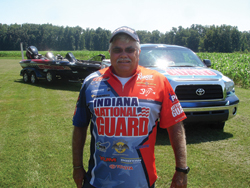



Fish Stories
Hanover
angler Thomas
has enjoyed 27 years of pro-fishing
He is more spokesman than sportsman
By
Laura Hodges
Contributing Writer
(August 2011) – What does it take to become
a successful professional fisherman? According to Hanover, Ind.’s
Wes Thomas, it takes these things:
• A sponsor with deep pockets. Entry fees can range up to $30,000
per tournament, with travel expenses on top of that.
• An ability to represent your sponsor well on all occasions. Fuji
Film once told him the cardinal rule is: “Don’t embarrass
the sponsor.”
• An understanding family.
That final point is accompanied by a wide smile from Thomas.
What about fishing ability?
Not so important, says Thomas, a pro fisherman since the 1980s.
“You can learn how to catch fish,” he says. But you must have
sponsors, and sponsors are looking for a competent fisherman who can
market their brand. Thomas has been that corporate-spokesman-in-a-fishing-shirt
for 27 years, earning payouts as much as $10,000 per tournament.
 |
|
Photo
by Laura Hodges Hanover,
Ind., resident Wes Thomas |
His suggestion to young people who want to make a career
out of fishing: “Go to college and get a marketing degree.”
These days, he says, you can find out what you need to know about fishing
from the Internet.
Of course, that’s not the way Thomas, 61, got into fishing.
Growing up, his father was in the U.S. Navy, so Thomas’s family
was always stationed somewhere near water. Fishing was a natural diversion.
When his father retired in 1966 and moved the family to Jefferson County,
Ind., the teen-aged Thomas learned about freshwater fishing in the Ohio
River. In the late 1970s he started entering fishing tournaments. With
friends, he formed the Chelsea Bass Masters, part of the Indiana Bass
Federation. Although he’s the last of the original members who
is still active, the club now has 20-some members.
Every year since 1985, the Chelsea Bass Masters have taken 20 to 45
members of Madison’s Lide White Boys & Girls Club out for a
day of fishing, boating and mentoring. The fishermen also raise donations
for the club. Ray Black Jr., the Boys & Girls Club executive director,
says the donations have totaled more than $200,000 over 26 years.
“The Chelsea Bass Masters, their wives, families and friends have
helped to create a lifetime of memories for the children of the Lide
White Boys & Girls Club,” said Black. “I would have to
list Wes and all the Chelsea Bass masters as ‘Life Changers.’
”
While continuing to farm in Saluda Township, Thomas has been on the
professional fishing tour since the 1980s. He secured a sponsorship
from Ranger Boats in 1984 that continues to this day. He has several
other sponsorships as well, including Craig Toyota, Evinrude Outboards,
Minn Kota Motors and Hummingbird Electronics. This year he is proud
to have the Indiana National Guard as his major sponsor.
The national tournament season starts in mid-January in the southern
states. It continues through July. The FLW Championship is held in August,
this year in Hot Springs, Ark. Although he didn’t make it this
year, Thomas has qualified for this national championship, with a chance
to win a $1 million payout, several times in the past. In 2003, he finished
11th overall.
Regional and state competitions are held March through October. Then
there are a couple of months off. “We get November and December
to get the fever back again,” smiles Thomas.
All tournaments are catch-and-release, with a five-fish limit, so professionals
don’t harm the fishing environment for others.
Tournaments are usually week-long affairs, with practice on Sunday though
Tuesday, a day off on Wednesday, and competitive fishing on Thursday
through Saturday. During the competition, each fisherman will have a
“co-angler” on board to verify that the competitor followed
all the tournament rules and actually caught the fish he turns in to
weigh. The co-anglers fish off the back of the boat and can turn in
their catch for their own tournament. Thomas notes that becoming a co-angler
is a good way for novices to break into the world of professional fishing.
But how important is fishing ability?
Thomas says he learned the tricks of the trade by “trial and error.”
In his early days of fishing, it was important to talk with others to
learn the idiosyncrasies of various bodies of water. He relied on good
information, instinct and a little luck.
The advent of enhanced GPS and other electronic equipment has changed
the fishing game. Nowadays, Thomas uses two GPS systems to mark the
best fishing spots. “The fishing tournaments are getting more high
tech all the time,” he said. Every fisherman has the same opportunity
to map river or lake bottoms with GPS. This has created parity in the
field. In a field of 160 anglers in a tournament, there are usually
120 who are capable of winning, Thomas estimated.
The difference is that only 50 or so of them have what he calls “the
knowledge of fish” – the ability to predict where the fish
might go when weather or water conditions change. This is the part of
fishing that comes only with experience.
“Sometimes us old guys do well,” smiles Thomas.